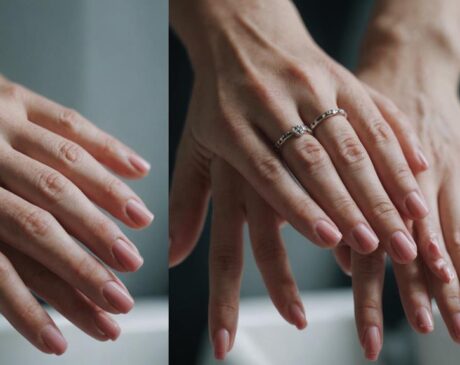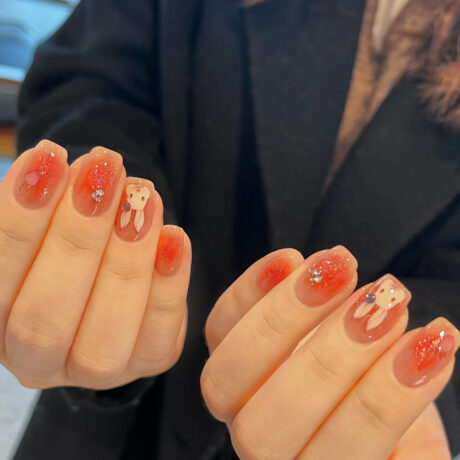What Does Salt Do to Your Nails?
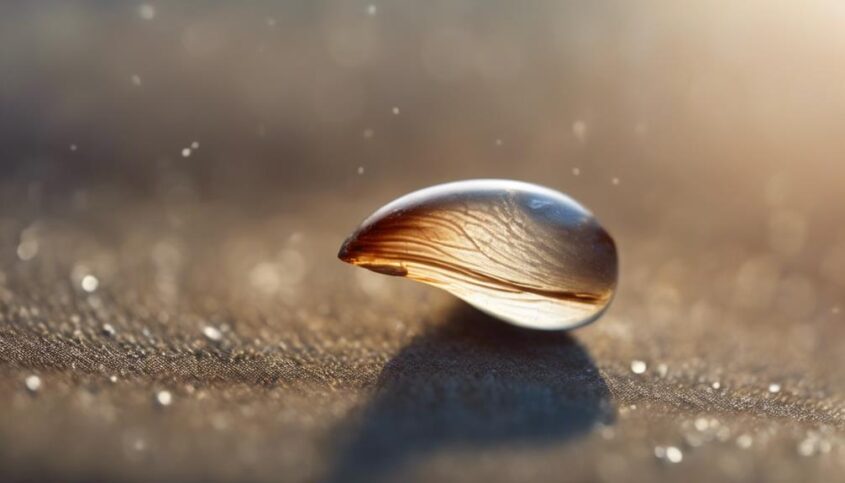
Exposure to salt can result in dry, brittle nails that are more prone to breakage and damage. Saltwater's dehydrating effects weaken nail structures, leading to brittleness and splits. High salt levels attract and retain moisture, dehydrating nails and causing weakness. To combat nail damage, protect nails from salt exposure, moisturize regularly, and consider nourishing treatments. Base coats and clear nail polish act as barriers, protecting against saltwater. Moisturizing with ingredients like shea butter or jojoba oil strengthens nails. For healthy nails in salt environments, focus on moisture, protection, and regular care. Learn more about maintaining strong, beautiful nails against salt-induced harm.
Key Takeaways
- Salt dehydrates nails, leading to dryness and brittleness.
- Exposure causes peeling, splitting, and discoloration.
- Weakens nail structure, increasing breakage risk.
- Moisturizing and protection are vital for nail health.
- Regular care, gloves, and hydration combat salt damage.
Effects of Salt on Nail Health
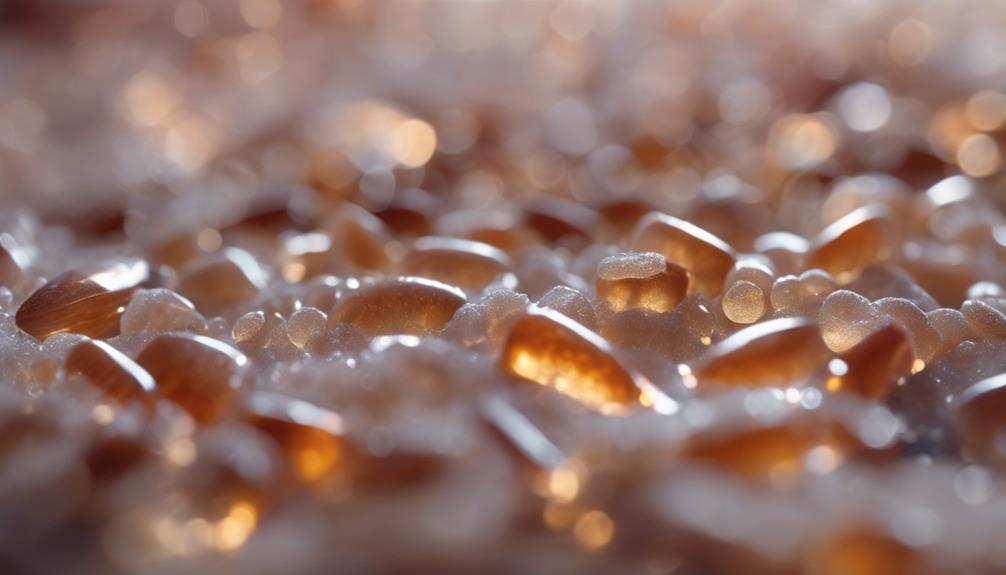
Exposure to high levels of salt can significantly impact the health and integrity of nails. Salt, a common element in our daily lives, can have detrimental effects on nail health if not properly managed. Nails may become dry, brittle, and prone to breakage when exposed to excessive salt, leading to discomfort and potential complications. It is essential to recognize the signs of salt-induced damage, such as peeling, splitting, or discoloration, and take proactive measures to mitigate these effects.
Maintaining nail health in the presence of salt involves regular moisturizing and protection. Using nail creams or oils rich in hydration can help replenish lost moisture and strengthen the nails' structure. Additionally, wearing gloves while engaging in activities with high salt exposure, such as dishwashing or swimming in saltwater, can provide a physical barrier of defense against harmful effects.
Impact of Saltwater on Nails
Examining the impact of saltwater on nails reveals potential damage and the gradual degradation of nail strength. This subtopic delves into the consequences of exposing nails to saltwater, shedding light on the negative effects that may arise. Understanding how saltwater affects nails is crucial in maintaining optimal nail health and preventing potential harm.
Saltwater Nail Damage
Saltwater can significantly weaken and damage nails due to its dehydrating effects and abrasive nature. When nails are exposed to saltwater for prolonged periods, they can become brittle, dry, and more prone to splitting and breakage. The salt in seawater draws moisture out of the nails, leaving them dehydrated and vulnerable. Additionally, the abrasive nature of saltwater can roughen the nail surface, leading to a lackluster appearance and potential peeling. To minimize saltwater nail damage, it is advisable to wear protective gloves while swimming or engaging in activities involving saltwater exposure. After being in saltwater, moisturizing the nails with a hydrating nail oil or cream can help restore moisture and prevent further damage.
Nail Strength Degradation
The prolonged presence of salt in aquatic environments can gradually diminish the strength and resilience of nails, making them more susceptible to damage and breakage. This degradation in nail strength occurs due to the following reasons:
- Dehydration: Saltwater can dehydrate the nails, making them dry and brittle.
- Chemical Erosion: The chemical composition of salt can erode the protective layers of the nails.
- Weakening of Structure: Continuous exposure to saltwater weakens the structure of the nails, leading to increased fragility.
It is essential to protect nails from prolonged exposure to saltwater to maintain their strength and prevent damage. Regular moisturizing and protective coatings can help mitigate the effects of salt on nails.
Salt's Role in Nail Weakness
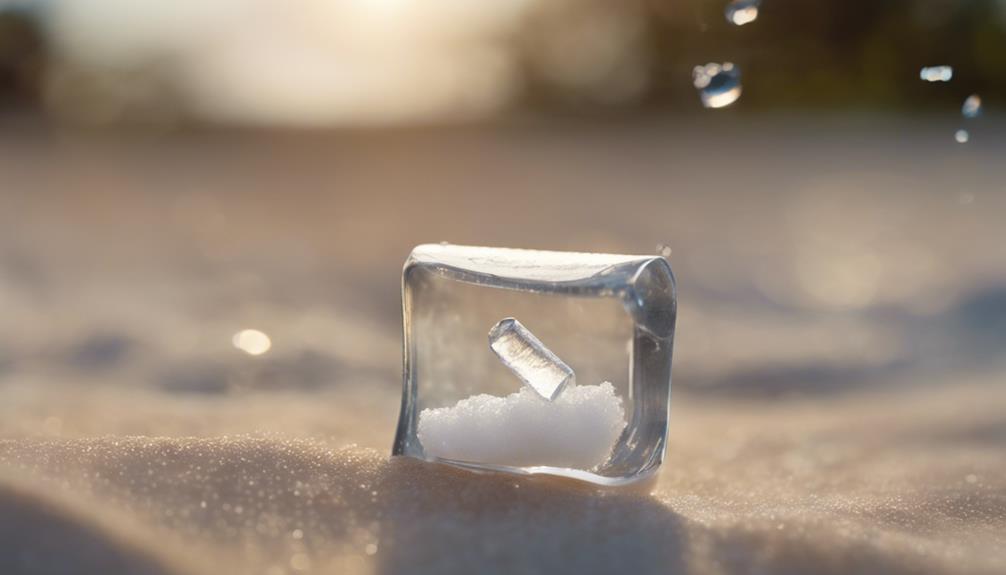
High levels of salt in the environment can contribute to the weakening of nails. Salt is hygroscopic, meaning it attracts and retains moisture. When nails are consistently exposed to high salt levels, they can become dehydrated, leading to dry, brittle nails that are more prone to breakage and splitting. This weakening effect is especially prominent in individuals who frequently immerse their hands in saltwater or work in environments with high salt concentrations, such as those near the ocean or in certain industries.
To combat the negative impact of salt on nail weakness, individuals should consider minimizing their exposure to saltwater and using protective gloves when working in salty environments. Additionally, maintaining proper nail care routines, including regular moisturizing and avoiding harsh chemicals, can help strengthen nails and prevent further damage caused by salt exposure. By being mindful of salt's role in nail weakness and taking proactive steps to protect and nourish the nails, individuals can promote healthier and stronger nails over time.
How Salt Affects Nail Growth
Exposure to elevated levels of salt can significantly impact the rate and quality of nail growth in individuals. Salt, when present in excess, can hinder the natural growth process of nails, leading to various issues. Here are some key points to consider:
- Slows Growth: High levels of salt can slow down the rate at which nails grow, causing frustration for individuals looking to maintain healthy and strong nails.
- Weakens Nails: Excessive salt exposure can weaken the structure of nails, making them more prone to breakage and damage.
- Affects Appearance: Salt can also affect the appearance of nails, leading to discoloration, ridges, and an overall unhealthy look.
It is essential to be mindful of salt exposure and its potential effects on nail growth. Taking steps to reduce salt intake and protect nails from excessive salt can help promote healthy nail growth and maintain strong, beautiful nails.
Preventing Salt-Related Nail Damage
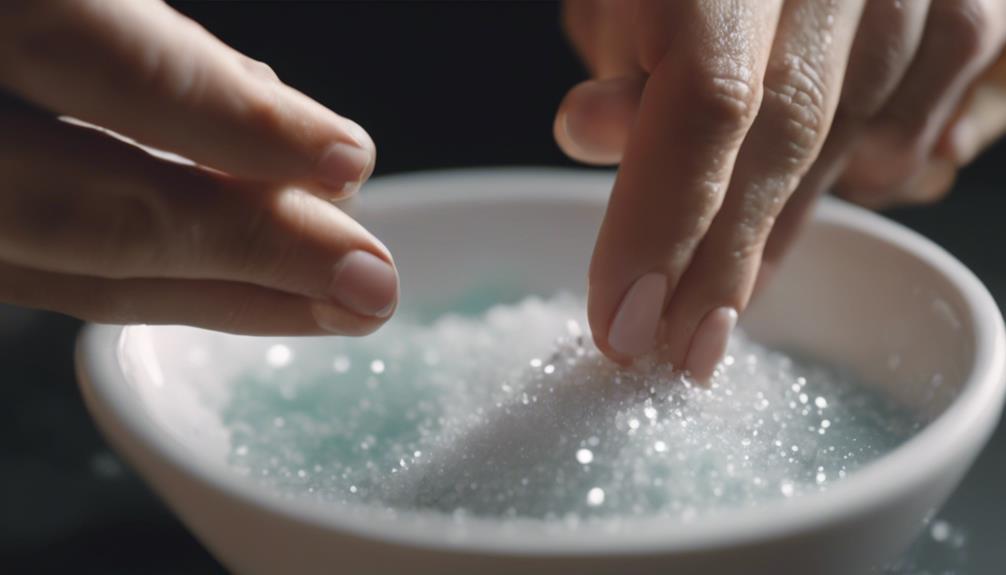
To prevent damage to nails caused by salt, it is important to be mindful of potential sources of salt exposure in daily activities and take proactive measures to protect nail health. When engaging in activities such as cooking or cleaning, wearing gloves can create a barrier between the salt and your nails. After exposure to saltwater, whether from swimming in the sea or using salt scrubs, it is crucial to rinse your hands thoroughly with fresh water and moisturize your nails to replenish lost hydration. Regularly applying a strengthening nail treatment can also help fortify nails against the harmful effects of salt. Additionally, maintaining a balanced diet rich in essential nutrients like biotin and vitamin E can promote overall nail health, making them more resilient to damage. By being mindful of salt exposure and implementing these preventive strategies, you can safeguard your nails from potential harm and maintain strong, healthy nails.
Salt and Nail Discoloration
Salt exposure can lead to discoloration of nails, affecting their appearance and overall health. This discoloration can be concerning for individuals who value the aesthetics of their nails. Here are some key points to consider regarding salt and nail discoloration:
- Staining: Salt can cause nails to become stained, resulting in a yellow or brownish tint that is difficult to remove.
- Brittleness: Exposure to salt can make nails more brittle, leading to an increased risk of breakage and further damage.
- Dehydration: Salt has the potential to dehydrate nails, making them appear dull and lacking the healthy shine associated with well-hydrated nails.
It is essential to take preventive measures to protect nails from salt-related discoloration and damage. Proper care, regular moisturization, and avoiding prolonged exposure to salt can help maintain the natural beauty and health of your nails.
Strengthening Nails Against Salt Exposure
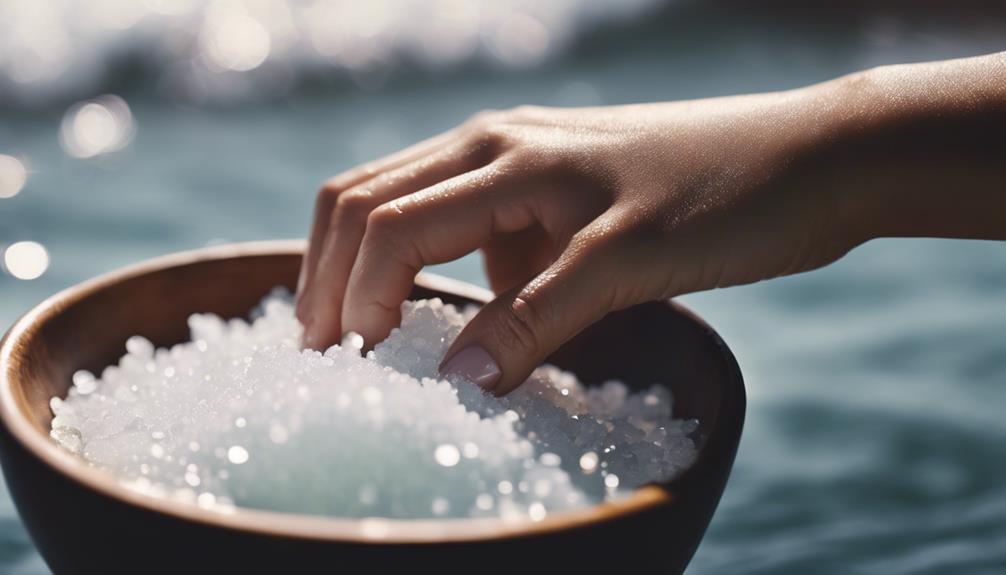
When it comes to strengthening nails against salt exposure, incorporating nail care tips, such as keeping nails trimmed and using protective coatings, can make a significant difference. Additionally, prevention strategies like wearing gloves while handling salt or cleaning solutions can help minimize damage. Regular moisturizing treatments can also play a crucial role in maintaining nail health and resilience against salt-induced stress.
Nail Care Tips
In order to fortify nails against the harmful effects of salt exposure, incorporating nourishing treatments and protective measures is essential. To strengthen nails against salt damage, consider the following nail care tips:
- Moisturize regularly: Hydrate your nails and cuticles with nourishing oils or creams to prevent brittleness and breakage.
- Use a protective base coat: Apply a base coat before painting your nails to create a barrier between the nail plate and saltwater.
- Wear gloves when exposed to salt: Shield your nails from direct contact with saltwater by wearing gloves while swimming or doing tasks involving salt exposure.
Salt Damage Prevention
To safeguard nails from the detrimental effects of salt exposure, implementing proactive measures is crucial for maintaining their strength and integrity. When anticipating salt exposure, consider applying a protective layer of clear nail polish to act as a barrier between the nails and the saltwater. Additionally, wearing gloves while engaging in activities involving saltwater can provide an extra layer of defense. Regularly moisturizing the nails and cuticles can also help prevent salt-induced damage, as hydrated nails are more resilient. Furthermore, incorporating a biotin-rich diet or supplements can promote nail strength from within. By taking these preventive steps, individuals can fortify their nails against the corrosive impact of salt exposure and maintain healthy, beautiful nails.
Moisturizing Treatments
Implementing effective moisturizing treatments is essential for strengthening nails against salt exposure. Moisturizing treatments help replenish lost moisture, enhance nail flexibility, and protect against salt-induced dryness and brittleness. Here are three beneficial moisturizing treatments to consider:
- Hydrating Nail Cream: Choose a cream rich in moisturizing ingredients like shea butter or jojoba oil to nourish and hydrate your nails.
- Cuticle Oil: Applying cuticle oil regularly helps maintain the health of your nails and surrounding skin, preventing dryness and promoting strength.
- Nighttime Nail Mask: Use a nourishing nail mask before bed to deeply hydrate and repair your nails overnight, combating the effects of salt exposure during the day.
Tips for Healthy Nails in Salt Environments
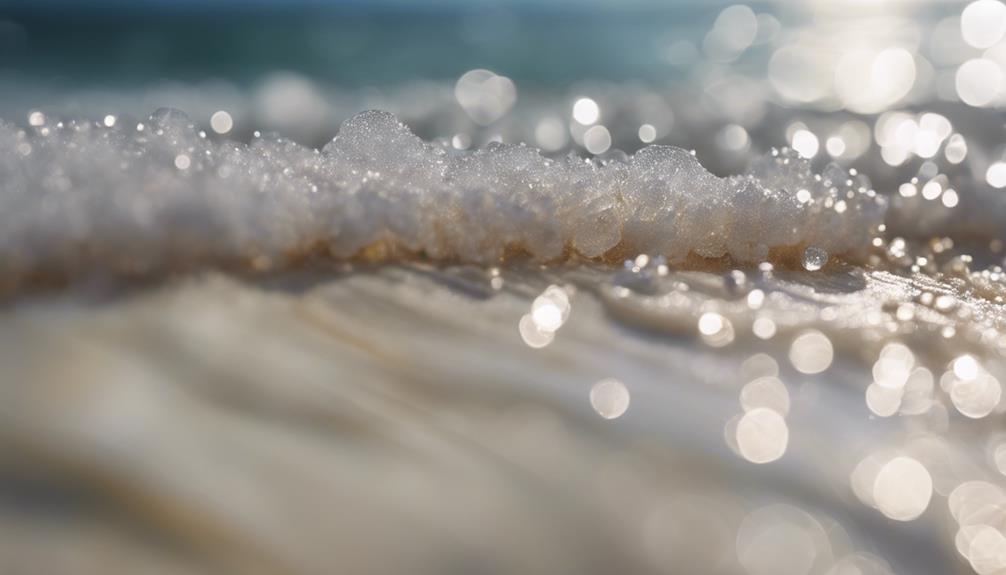
Maintaining healthy nails in salt environments requires diligent care and attention to specific factors that can impact nail health. When in salt environments, such as coastal areas or while swimming in the ocean, it is essential to implement a few key tips to keep your nails strong and beautiful. Firstly, ensure that you regularly moisturize your nails and cuticles to prevent them from becoming dry and brittle due to the dehydrating effects of saltwater. Using a rich, hydrating nail oil or cream can help maintain the moisture balance.
Additionally, it is crucial to protect your nails by wearing gloves while performing tasks that expose them to saltwater or salty air for extended periods. This simple step can prevent unnecessary damage and breakage. Furthermore, consider incorporating a biotin supplement into your daily routine, as biotin is known to promote healthy nail growth. Lastly, make sure to trim and file your nails regularly to prevent them from splitting or breaking. By following these tips, you can enjoy strong, healthy nails even in salt-filled environments.
Frequently Asked Questions
Can Saltwater Damage Nails Permanently?
Saltwater can potentially damage nails permanently if not properly cared for. Exposure to saltwater can lead to dehydration and weakening of nails, making them brittle and more prone to breakage. Regular moisturizing and protection are essential.
Does Salt Make Nails More Brittle?
Salt can make nails more brittle by stripping away moisture, leading to dryness and weakness. This can result in increased breakage and splitting. Proper hydration and protection can help mitigate the effects of salt on nail health.
Is Nail Peeling Caused by Salt Exposure Reversible?
Nail peeling caused by salt exposure may be reversible through proper care and hydration. Regular moisturizing, protective coatings, and minimizing salt exposure can help restore nail health. Consult a dermatologist for personalized advice.
Can Salt Affect the Natural Nail Shape?
Salt can alter the natural shape of nails due to its dehydrating properties. Prolonged exposure may cause nails to become brittle, leading to changes in shape. Regular moisturizing and protection can help maintain healthy nail structure despite salt exposure.
Are There Specific Nail Care Products for Saltwater Exposure?
For individuals exposed to saltwater, it is advisable to use nail care products designed to provide protection and nourishment. Look for formulations that can help combat the potential drying effects of saltwater on nails.



